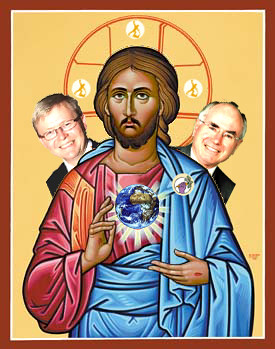
Jarrod McKenna’s Wednesday’s with Gandhi:
“When I admire the wonder of a sunset or the beauty of the moon, my soul expands in worship of the Creator. I try to see Him and His Mercies in all these creations. But even the sunsets and sunrises would be mere hindrances if they did not help me to think of Him. Anything, which is a hinderance to the flight of the soul, is a delusion and a snare; even like the body, which often does actually hinder you in the path of salvation.”
-Gandhi
How does this quote strike you?
This morning I write this post from under the shade of eucalypts in the Lockridge community garden that us Peace Tree crew have helped birthed with other locals. One of the things that has shaped the Peace Tree is what the Spirit has stirred in us regarding the gospel being good news for all of creation (not just humans) and considering what this means in a society that is seemingly asleep behind the shopping trolley while we hurtle towards creation destruction (for those of us who have trouble connecting the dots… that means self destruction!). The Lockridge Community Garden is an exciting and humble venture in reconciliation, permaculture, food security, the reclaiming of public space, and as Harry (showing of his crazy latin skills and penchant for St. Benedict would say) “ora et labora” (prayer and work). Because it’s a Wednesday there a number of people who are volunteering in the garden, one of which is a friend who is a Buddhist nun. I ran the quote by her for her take:
“I really like it. He seems to be talking about detachment and perception and that what is external can either help or hinder depending on your state of mind.”
What I found so interesting is that I think many Christians, not just liberals, but evangelicals would actually agree with my Buddhist friend. They would use different language (maybe language simular to what Gandhi) uses here to say,
“It’s great but don’t let it (God’s good creation) get in the way of spirituality, or relationship to God, or ‘the gospel’ or ‘eternal salvation’.”
It’s always risky to paint with broad brushstrokes but the quote above reveals something Gandhi’s worldview where he viewed the goal of faith being a spiritual salvation (moksha) form the ‘illusion of this world’ while living lives of loving service. This ‘dualism with an activist twist’ is sadly what many Christians think the gospel is about as well. Somehow today Christians often think that right relationship with each other and with the land is a secondary thought to right relationship to God. For the early Christians it was an integral part of the reconciliation of all things which God has started in Jesus.

Somehow today Christians have walked away from our calling to be image bearers and witnesses to the transformation of creation (the coming of the kingdom). Instead we have become religious vendors of ‘spirituality’ to accompany the foolish and diabolical destruction of creation. Instead of preaching ‘in Jesus the exodus from all domination has started’ we preach a neo-Gnostism of ‘in Jesus the exodus from creation has started’. As my friend Ian Barns recently wrote:
“many Christians believe that God is primarily interested in humans and their eternal salvation, and not in other creatures and ecosystems. Although the doctrine of creation (God made the world and saw that it was good) saves us from being Manichean (matter is bad, spirit is good) nonetheless, Christian worship, practice, and theology and involvement in worldly life is shaped by a practical dualism which makes us generally unconcerned about ecological issues. Moreover, the focus on issues of personal spirituality means that we fit comfortably within the utilitarian approach to the natural world that is part of modern urban and industrial life.”
“For this movement of American evangelicals, issues of abortion, same sex marriage, and stem cell research have been much more important issues than the long term health of the planet. To be sure, in February 2005, 83 prominent US evangelicals published the so-called ‘Evangelical Climate Initiative’, with a ‘Call to Action’ to governments and churches. Yet evangelical leaders such as James Dobson, Jerry Falwell, Charles Colson and Don Carson actively opposed this initiative.”

And drawing on NT Wright issues this prophetic call:
“if we pay attention to the ‘bigger picture’ gospel that the Bible proclaims, we can see that far from being merely a temporary vehicle for us humans as we make our way to heaven, the creation is integral to God’s salvation purpose. God does not make a good creation, which he then destroys because of the disfiguring effects of human sin. Rather, his eternal purpose is that, as human creatures faithfully reflect God’s image, the created order should enter into the liberty of the children of God (Romans 8). The gospel message is that Jesus, the first born of a renewed humanity, has done what Adam, and humanity ‘ after the sinful flesh’, could not do: be the perfect image of God. Through his obedience unto death, Jesus opens the way for not just humanity, but God’s good creation, to enter into that glorious destiny God always intended.”
Living during this ecological crisis, if we are to have any integrity to the Scriptures, the early Church, and our Lord, we must preach a full gospel that is good news to all of creation. Otherwise “evangelical” will no longer be associated with ‘good news’.











 That’s the language used by the fastest growing religion in Jesus’ day, the Cult of Caesar. The ‘Cult of Caesar’ announced Caesar as Divine and provided the spirituality for the Empire’s invasion, colonisation, oppression and continual domination. This unnamed soldiers job was his spiritual act of worship, to oversee the brutal and public humiliation of those who would challenge the hegemonic control of the world by it’s true Lord and Son of God, Caesar, the Roman Emperor. The Empire did this through Caesar’s saving methods, means, politics, ethics and spirituality; VIOLENCE. In particular for this centurion, his job was overseeing the violence of crucifixion which made a spectacle of would be revolutionaries that would challenge Caesar as Divine Ruler of the world.
That’s the language used by the fastest growing religion in Jesus’ day, the Cult of Caesar. The ‘Cult of Caesar’ announced Caesar as Divine and provided the spirituality for the Empire’s invasion, colonisation, oppression and continual domination. This unnamed soldiers job was his spiritual act of worship, to oversee the brutal and public humiliation of those who would challenge the hegemonic control of the world by it’s true Lord and Son of God, Caesar, the Roman Emperor. The Empire did this through Caesar’s saving methods, means, politics, ethics and spirituality; VIOLENCE. In particular for this centurion, his job was overseeing the violence of crucifixion which made a spectacle of would be revolutionaries that would challenge Caesar as Divine Ruler of the world.
 As N.T. Wright has said,
As N.T. Wright has said,
 The early church, filled with the Holy Spirit, did just that and it often cost them there lives. Much like the unarmed actions of the Buddhist monks in Burma this week, the early church showed a fearlessness in the face of the rebellious principalities and powers. Yet unlike the monks and their brave actions (which I admire deeply) where not simply fueled by the desperation of the situation but by the resurrection of the Son of God; the dawning of God’s nonviolent dream for creation. Unquestionably they understood the cross to be what God has done for us, empowering us to “put away the sword” and to take up the cross as our way of defeating evil (as seen in the early churches refusal to fight wars for first three centuries of Christianity).
The early church, filled with the Holy Spirit, did just that and it often cost them there lives. Much like the unarmed actions of the Buddhist monks in Burma this week, the early church showed a fearlessness in the face of the rebellious principalities and powers. Yet unlike the monks and their brave actions (which I admire deeply) where not simply fueled by the desperation of the situation but by the resurrection of the Son of God; the dawning of God’s nonviolent dream for creation. Unquestionably they understood the cross to be what God has done for us, empowering us to “put away the sword” and to take up the cross as our way of defeating evil (as seen in the early churches refusal to fight wars for first three centuries of Christianity).